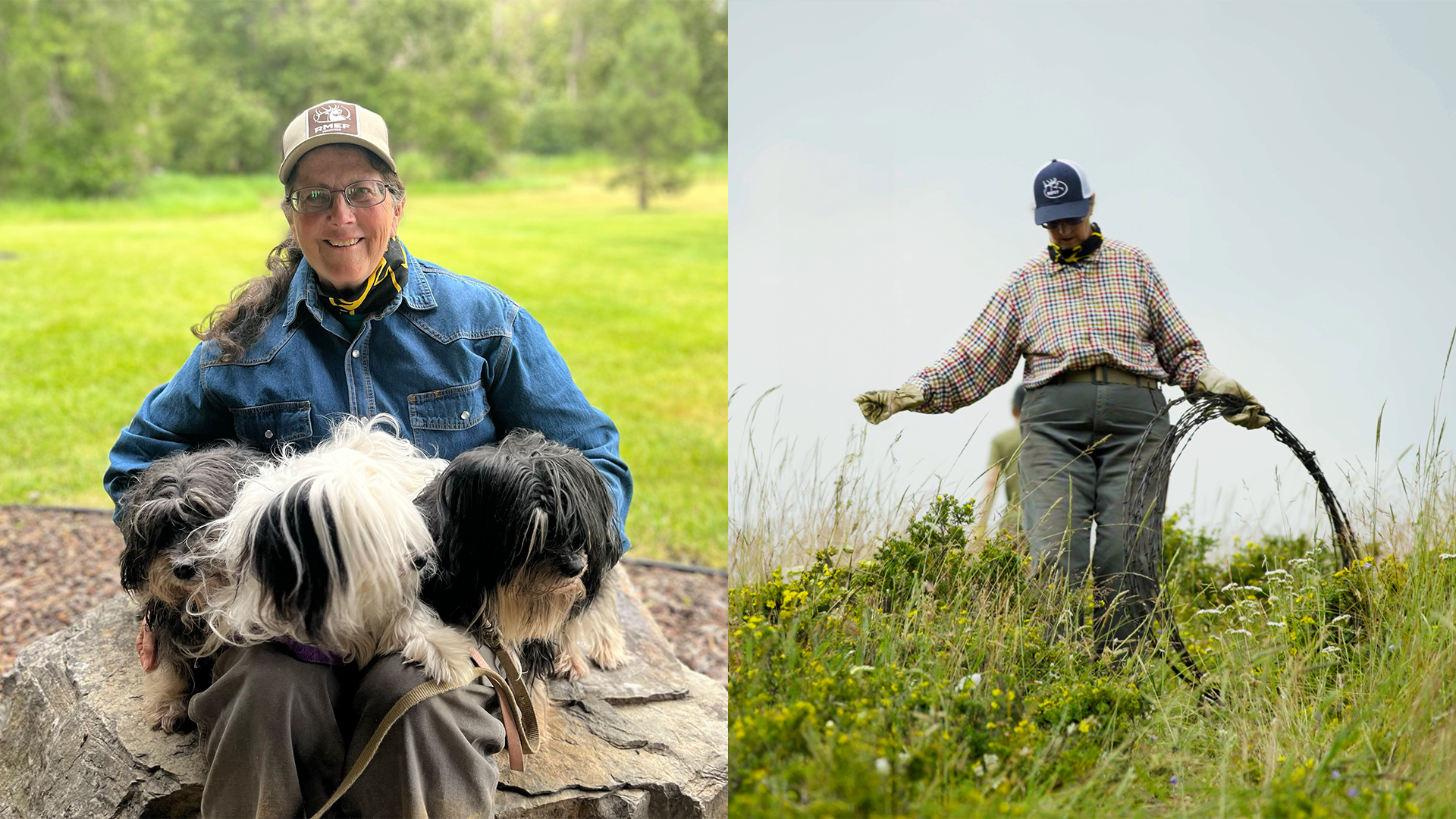(Photo credit: RMEF)
Lasting Legacies
by Heather Fraley
Carole Rowland travels for conservation with her dogs in tow.
From her home in Iowa, Carole Rowland and her three Havanese dogs, Andrew, Tanner and Sam’s Angel, have traveled more than 15,000 miles to reach RMEF volunteer projects. They’ve attended the Hiawatha volunteer wire pull project along the Montana-Idaho border five years in a row and participated in a wildlife-friendly fencing project in Buffalo, Wyoming.
Her small, shaggy companions provide moral support while Carole, clad in an RMEF hat and bandana, denim shirt, work pants and Danner hiking boots, wields wire cutters, post pounders and more.
Carole doesn’t hunt anymore—except with her camera—and she’s from a state sans wild elk, but she’s captivated by RMEF’s flagship animal. She remembers the first time she heard an elk bugle on a solo drive West.
“It’s something that you’ll never forget once you’ve heard it. It’s there; it’s engrained forever. It’s a special moment,” she says.
Carole’s affinity for animals started in childhood. Her parents raised Angus cattle on the family farm near Knoxville, Iowa, and Carole participated in 4-H. In high school, when a survey came around asking for each student’s post-graduation plans, she wrote, “I’m going to farm.” But her mother insisted she continue her education. She played basketball at Northeast Missouri State University and earned two bachelor’s of science in education degrees in health, physical education and recreation and environmental sciences. Carole had already signed up to serve in the U.S. Air Force after graduation. Then the University asked her to stay on and teach. She was able to delay her enlistment for a year, teach and earn her master’s degree in physical sciences. Carole’s initial six-year enlistment in the Air Force turned into 23 years of service. When she was trying to afford to keep the family farm, she needed a higher-paying job and turned to long-haul trucking. The farm slipped through her fingers, but she discovered she loved the freedom of the road and the sight of snow on the mountains.
Carole joined RMEF in 2006 after seeing a newspaper ad for a banquet in Des Moines. She walked up to the main organizer of the fundraiser and said, “’alright, alright, tell me why I should be a Life Member?”
Carole became a Life Member and joined the committee in Des Moines where fellow volunteers say her help is invaluable.
“In planning season, Carole is always asking questions to make sure we’re all on the same page, and she’s so proactive; she asks for assignments to work on between meetings,” says fellow committee member Clark Schoening.
As each new issue of Bugle arrived in her mailbox, Carole read stories of volunteers removing defunct fencing or installing water guzzlers. After retirement, she called RMEF headquarters in 2020 and asked, “who do I talk to about getting involved in these projects?” Two days later, former RMEF Regional Director Wayne Brood reached out to her about the Hiawatha wire pull, an effort to remove old communication wire along a former train route. An RMEF member had previously found the skull of a bull elk wrapped in the wire and reached out to the foundation to start a project to prevent further entanglements.
Never one to see an animal suffer without lifting a hand to help, Carole jumped on board. “I don’t think she kills spiders,” says Brood. “She’s all about every animal on this planet has its place and we need to take care of it.”
At the end of the conversation Carole asked,“by the way, where is the project going to be held?” Brood asked if Idaho was too far away. Carole replied “No, I just needed to know which direction I’m headed.” After her work as a trucker, Carole wasn’t fazed by the 20-hour drive. She’s returned to the Hiawatha every year since, including for the 5th anniversary project in 2024. And it’s led to other adventures. Jameson Sharp, RMEF regional director for southern Idaho, says Carole started popping up everywhere to volunteer. “Next thing I know we’re getting ready for the ladies’ event in Boise and there’s Carole helping out,” he says. She’d been invited by a Boise volunteer who had also attended the Hiawatha project.
Carole loves wildlife so much that she wants to keep helping conserve their habitat after she’s gone. Because she doesn’t have a spouse or children, her priority in her estate planning is to first make accommodations for any pets she owns at the time of her passing, then to help support wildlife conservation. With that in mind, she’s joined RMEF’s Trails Society by including the foundation in her will as a beneficiary of her estate.
She also looks forward to more volunteering. Carole encourages chapter project coordinators to contact her anytime, and she’ll do her best to show up to help. One thing that draws Carole to RMEF is the can‑do attitude of its members. “Too many people out there, they don’t give a rat’s a–, and that bugs me. I can’t stand that. And I was just like, ‘OK I’m in the right group with RMEF because these people care,‘” she says.
